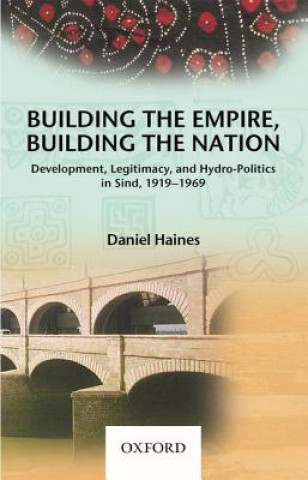
Kod: 04528880
Building the Empire, Building the Nation
Autor Daniel Haines
European empires disintegrated during the twentieth century, leaving newly-formed postcolonial states in their wake. In this turbulent period, governments sought new political idioms to support their claims to legitimacy as modern ... więcej
- Język:
 Angielski
Angielski - Oprawa: Twarda
- Liczba stron: 250
Wydawca: OUP Pakistan, 2013
- Więcej informacji o książce

Zobacz książki o podobnej tematyce
-

Dune
50.32 zł -3 % -

Haunting Adeline
125.47 zł -1 % -

Berserk Deluxe Volume 2
212.67 zł -1 % -

White Nights
10.94 zł -28 % -

Powerless
48.61 zł -11 % -

Atomic Habits
57.35 zł -28 % -

Dune Messiah
46.20 zł -3 % -

Berserk Deluxe Volume 3
217.79 zł -3 % -

One Day
34.25 zł -44 % -

Berserk Deluxe Volume 1
211.26 zł -2 % -

Iron Flame
60.97 zł -28 % -

Surrounded by Idiots
36.66 zł -28 % -

Harry Potter and the Prisoner of Azkaban (Minalima Edition)
169.97 zł -2 % -

Gravity Falls Journal 3
89 zł -

Heaven Official's Blessing: Tian Guan Ci Fu (Novel) Vol. 1
89.40 zł -

The Creative Act
102.66 zł -12 % -

Dune
47.21 zł -23 % -

Hunting Adeline
125.97 zł -4 % -

A Little Life
48.61 zł -11 % -

Children of Dune
46.61 zł -2 % -

Heaven Official's Blessing: Tian Guan Ci Fu (Novel) Vol. 2
77.55 zł -14 %
Powiadomienie o dostępności
Wpisz swój adres e-mail, aby otrzymać od nas powiadomienie,
gdy książka będzie dostępna. Proste, prawda?
Więcej informacji o Building the Empire, Building the Nation
 Opis
Opis
European empires disintegrated during the twentieth century, leaving newly-formed postcolonial states in their wake. In this turbulent period, governments sought new political idioms to support their claims to legitimacy as modern states. In Sindh, a part of British India and (later) of Pakistan, the late colonial and early post-colonial states combined major attempts to control the natural environment with a serious engagement with representative politics in their bid for legitimacy. The construction of three barrage dams across the River Indus, along with a network of irrigation canals, enacted human control over nature as a political project; while the complicated relationship between bureaucracies and legislatures moved towards a democratic ideal after the First World War. This book examines tensions between representative and developmental sources of state legitimacy. It argues that the democratic trend of constitutional changes during the middle of the century conflicted with the authoritarian economic imperatives of the barrage projects, which Sindh's rulers believed to be necessary for the projects' successful execution. The barrage projects were based on the concept, endorsed by British officials and their Pakistani successors, that material progress would bring prosperity and happiness to Sindh. Both the colonial and post-colonial governments capitalized on the projects' rhetorical potential, creating a discourse in which the modern state's unique ability to mobilize scientific expertise in the public good justified its rule. This book argues that the late colonial and early postcolonial states had a great deal in common. It demonstrates this contention by highlighting similarities between the actions and rhetoric of governments before and after Partition in building and managing the barrage projects. The changing relationships between rulers, politicians and rural magnates between the 1920s and 1960s were intertwined with the rising idea that the state was responsible for promoting material progress, as well as the idea of extending political participation among Sindhis. Moreover, groups of Sindhi politicians appropriated discourses of science and development during the 1920s and 1930s, and used them to compete with the British-controlled state and with each other. This was the basis for the government's enthusiasm for development projects such as new barrages in early Pakistan, and ensured that contemporary development's state-centric tendencies remained strong. Based on archival material gathered in Pakistan, India, the UK and the USA, the book fills a gap in historical writing on modern Sindh, particularly after Partition; and contributes to scholarship on the modern state (particularly in the South Asian context). It engages, too, with the rising field of environmental history, and emphasizes the politics of the exploitation of the natural world. The book provides a counterpoint to the trend in South Asian historiography over the last twenty years of focusing on identity politics and, more recently, the 'everyday state': instead, it asserts the continued importance of broader analysis of how modern states have engaged with large-scale infrastructural development in conjunction with constitutional change. It also explores, in a Pakistani context, themes that writers on India have raised in relation to dams and development.
 Szczegóły książki
Szczegóły książki
Kategoria Książki po angielsku Humanities History Regional & national history
- Pełny tytuł: Building the Empire, Building the Nation
- Autor: Daniel Haines
- Język:
 Angielski
Angielski - Oprawa: Twarda
- Liczba stron: 250
- EAN: 9780199068487
- ISBN: 0199068488
- ID: 04528880
- Wydawca: OUP Pakistan
- Waga: 548 g
- Wymiary: 228 × 149 × 24 mm
- Data wydania: 10. October 2013
zadowolonych klientów
Od roku 2008 obsłużyliśmy wielu miłośników książek, ale dla nas każdy był tym wyjątkowym.
Copyright! ©2008-24 libristo.pl Wszelkie prawa zastrzeżonePrywatnieCookies



 21 milionów książek
21 milionów książek Dostawa 10.99 zł
Dostawa 10.99 zł (32) 444 93 66 (8-15.30h)
(32) 444 93 66 (8-15.30h)